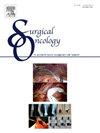德尔福治疗N2型非小细胞肺癌
IF 2.4
4区 医学
Q3 ONCOLOGY
引用次数: 0
摘要
纵隔淋巴结受累是局部非小细胞肺癌患者的预后因素。同侧和隆突下淋巴结受累均归为N2型疾病。然而,目前还没有普遍认可的诊断和治疗方法。本研究的目的是阐述一个机构N2共识。法国上帝酒店的一个多学科专家小组提供了参与修改后的德尔菲程序的知情同意。由三名独立审稿人组成的指导委员会在国际共识、医学文献和个人经验的基础上提出了12项基本声明。在第一轮中,医生们回答了一份开放式问卷,并对问卷进行了主题分析。在第二轮中,参与者对生成的语句进行评分并添加评论。在第三轮中,参与者通过6分李克特量表对他们的同意程度进行评分。一致性定义为≥80%的一致性(A+或A)。19名医生完成了三轮检查。11项声明达成了完全的一致意见。对于可切除的N2疾病患者,术前纵隔分期是强制性的。对于SUVmax(最大标准化摄取值)高(≥3)、近端或根尖肿瘤和高癌胚抗原水平的患者应考虑。手术是在没有新辅助治疗的情况下进行的,这取决于单个站点的非大块性疾病和T3期侵袭性/T4期疾病。在几个站点的N2疾病患者中,放化疗是主要治疗方法,其次是一般状况良好的患者杜伐单抗。在pN2患者中,术后治疗是基于手术切除边缘的情况。这些发现将有助于医生在多学科讨论中就临床决策达成一致。本文章由计算机程序翻译,如有差异,请以英文原文为准。
Delphi for management of N2 non-small cell lung cancer
Mediastinal lymph node involvement is a prognostic factor in patients with localized NSCLC. Both ipsilateral and subcarinal nodal involvement are classified as N2 disease. However, there is no universally agreed-upon approach for diagnosing and treating this condition. The aim of this study is to elaborate an institutional N2 consensus. A multidisciplinary expert panel at Hotel Dieu de France provided informed consent to participate in the modified Delphi process. Twelve basic statements were started by a steering committee of three independent reviewers on the basis of international consensus, medical literature and personal experience. In the first round, physicians answered an open-ended questionnaire that was analyzed thematically. In the second round, the participants rated the generated statements and added their comments. In the third round, the participants rated their agreement via a 6-point Likert scale. Consensus was defined as ≥80 % agreement (A+ or A) with a statement. Nineteen physicians completed the three rounds. A full consensus was reached in eleven statements. Preoperative mediastinal staging is mandatory in patients with resectable N2 disease. It should be considered in patients with a high SUVmax (maximum standardized uptake value) (≥3), proximal or apical tumors and high carcinoembryonic antigen levels. Surgery is performed in the absence of neoadjuvant treatment depending on a single station with nonbulky disease and stage T3 invasive/T4 disease. In patients with N2 disease at several stations, radio chemotherapy is the main treatment, followed by durvalumab in patients with good general status. In pN2 patients, postsurgical treatment is based on the condition of the surgical resection margin. These findings will help physicians in multidisciplinary discussions agree on clinical decisions.
求助全文
通过发布文献求助,成功后即可免费获取论文全文。
去求助
来源期刊

Surgical Oncology-Oxford
医学-外科
CiteScore
4.50
自引率
0.00%
发文量
169
审稿时长
38 days
期刊介绍:
Surgical Oncology is a peer reviewed journal publishing review articles that contribute to the advancement of knowledge in surgical oncology and related fields of interest. Articles represent a spectrum of current technology in oncology research as well as those concerning clinical trials, surgical technique, methods of investigation and patient evaluation. Surgical Oncology publishes comprehensive Reviews that examine individual topics in considerable detail, in addition to editorials and commentaries which focus on selected papers. The journal also publishes special issues which explore topics of interest to surgical oncologists in great detail - outlining recent advancements and providing readers with the most up to date information.
 求助内容:
求助内容: 应助结果提醒方式:
应助结果提醒方式:


